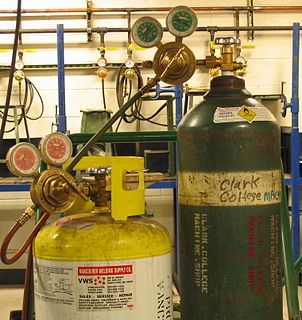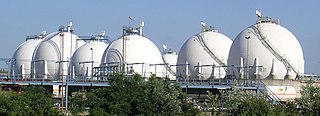
An explosive is a reactive substance that contains a great amount of potential energy that can produce an explosion if released suddenly, usually accompanied by the production of light, heat, sound, and pressure. An explosive charge is a measured quantity of explosive material, which may either be composed solely of one ingredient or be a mixture containing at least two substances.

A boiling liquid expanding vapor explosion is an explosion caused by the rupture of a vessel containing a pressurized liquid that has reached temperatures above its boiling point. Because the boiling point of a liquid rises with pressure, the contents of the pressurized vessel can remain liquid so long as the vessel is intact. If the vessel's integrity is compromised, the loss of pressure and dropping boiling point can cause the liquid to rapidly convert to gas and expand extremely rapidly. If the gas is combustible as well, as is the case e.g. with hydrocarbons and alcohols, further damage can be caused by an ensuing fire.

A gas cylinder is a pressure vessel for storage and containment of gases at above atmospheric pressure. High-pressure gas cylinders are also called bottles. Inside the cylinder the stored contents may be in a state of compressed gas, vapor over liquid, supercritical fluid, or dissolved in a substrate material, depending on the physical characteristics of the contents. A typical gas cylinder design is elongated, standing upright on a flattened bottom end, with the valve and fitting at the top for connecting to the receiving apparatus.

The regulation of therapeutic goods, defined as drugs and therapeutic devices, varies by jurisdiction. In some countries, such as the United States, they are regulated at the national level by a single agency. In other jurisdictions they are regulated at the state level, or at both state and national levels by various bodies, as in Australia.
The ATEX directives are two EU directives describing the minimum safety requirements for workplaces and equipment used in explosive atmospheres. The name is an initialisation of the French term Appareils destinés à être utilisés en ATmosphères EXplosives.

Storage tanks are containers that hold liquids, compressed gases or mediums used for the short- or long-term storage of heat or cold. The term can be used for reservoirs, and for manufactured containers. The usage of the word tank for reservoirs is uncommon in American English but is moderately common in British English. In other countries, the term tends to refer only to artificial containers.

The Control of Substances Hazardous to Health Regulations 2002 is a United Kingdom Statutory Instrument which states general requirements imposed on employers to protect employees and other persons from the hazards of substances used at work by risk assessment, control of exposure, health surveillance and incident planning. There are also duties on employees to take care of their own exposure to hazardous substances and prohibitions on the import of certain substances into the European Economic Area. The regulations reenacted, with amendments, the Control of Substances Hazardous to Work Regulations 1999 and implement several European Union directives.

The Directorate of Revenue Intelligence (DRI) is an Indian intelligence agency. It is India's apex anti-smuggling intelligence, investigations and operations agency.
"Right to know" empowers "people by allowing them to participate in an informed way in decisions that affect them, while also holding governments and others accountable". It pursues universal access to information as essential foundations of inclusive knowledge societies.
The history of fire safety legislation in the United Kingdom formally covers the period from the formation of the United Kingdom of Great Britain and Ireland in 1801 but is founded in the history of such legislation in England and Wales, and Scotland before 1708, and that of the Kingdom of Great Britain from 1707 to 1800.
Sector Commander is the position title of the commanding officer of a United States Coast Guard Sector, usually of the rank of Captain (O-6). The Sector Commander's second-in-command is the Deputy Sector Commander. Also reporting directly to the Sector Commander are the Command Master Chief (CMC), the Senior Reserve Officer, and the Sector's Auxiliary Coordinator.

The Reporting of Injuries, Diseases and Dangerous Occurrences Regulations 2013, often known by the acronym RIDDOR, is a 2013 statutory instrument of the Parliament of the United Kingdom. It regulates the statutory obligation to report deaths, injuries, diseases and "dangerous occurrences", including near misses, that take place at work or in connection with work.
The Oil Industry Safety Directorate (OISD) is a technical advisory body in India. It was established in 1986 by Ministry of Petroleum and Natural Gas. The OISD formulates and implements safety standards for the oil industry.
Indian Register of Shipping (IRClass) is an internationally recognised, independent ship classification society, founded in India in 1975. It is a Non-Profit organisation, Public undertaking and a member of the 12 member International Association of Classification Societies (IACS). It was inducted into IACS along with Croatian Register of Shipping (CRS) and Polish Register of Shipping (PRS).

Ministry of Emergency Situations of Azerbaijan Republic is the central executive body within the cabinet of Azerbaijan Republic responsible for protecting the population from natural and manmade disasters. The ministry is headed by Kamaladdin Heydarov.
The 2012 Sivakasi factory explosion was an explosion at the Om Sakthi Fireworks Industries fireworks factory in Sivakasi, India on 5 September 2012. 40 people were killed and more than 70 injured. The tragedy occurred in a fireworks factory which did not have a valid licence.

The Hazardous Materials Transportation Act (HMTA), enacted in 1975, is the principal federal law in the United States regulating the transportation of hazardous materials. Its purpose is to "protect against the risks to life, property, and the environment that are inherent in the transportation of hazardous material in intrastate, interstate, and foreign commerce" under the authority of the United States Secretary of Transportation.

On 10 April 2016 at approximately 03:30 AM IST, the Puttingal Temple in Paravur, Kollam, Kerala, India, experienced an explosion and fire after firework celebrations went awry. As a result, 111 people were killed and more than 350 were injured, including some with severe burns. The temple and at least 150 houses in the area of the temple were damaged by the blast. According to local reports and eyewitnesses, the explosion and fire were caused by sparks from a firecracker being used in a competitive fireworks display igniting fireworks in a concrete storehouse. The temple did not have permission from Kerala government authorities to conduct a "competitive fireworks display". About 15,000 pilgrims were visiting the temple to mark local Hindu celebrations during the last day of a seven-day festival of the goddess Bhadrakali.

The Petroleum (Consolidation) Act 1929 is an Act of the Parliament of Northern Ireland which consolidates enactments relating to petroleum and petroleum products that already applied to other parts of the United Kingdom.

R Venugopal is an Indian engineer who is Deputy Chief Controller of Explosives in Petroleum and Explosives Safety Organisation (PESO), Government of India.










